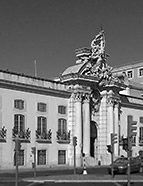

From the Government of the Forte de S. Julião da Barra, documentation covering the period from 1802 to 1850 was collected, although the documentation from the year 1817, related to General Freire de Andrade had disappeared. Also, documentation prior to 1850 and all the Regimental Order Books prior to 1 January 1900, were transferred from the 1st General Directorate of the Ministry of War.
After 28 May 1926, and by decree of 18 December 1928, the Portuguese Expeditionary Corps Archive, which was under the 3rd General Directorate of the Ministry of War, was extinguished, and all the documents fell under the responsibility of the Military History Archive. By determination of the Office of the Minister's Cabinet on 30 April 1930, all photographs of deceased Army officers in the Photographic Archive of the Office of the Minister's Cabinet were sent to the Military History Archive as soon as their death had been published in the Ordem do Exército [official bulletin]. In 1948, the so-called Lisbon Military Archive, restored by the Brazilian Government, holding documents from the time of the Count of Lippe, and others from the 17th, 18th, and 19th centuries, which King John VI had taken to Rio de Janeiro, was handed over to the Military History Archive. In 1951, the Military History Archive was transferred from Santa Clara to the premises it currently occupies on the 1st, 2nd, and 3rd floors of the East wing of the Army Headquarters building in Lisbon. Only in 1973 were the new rules and procedures of the Military History Archive approved, by decree 123/74 of 24 March, which adapted the service to the existing military organisation and formalised the establishment of a technical office. It also regulated the annual publication of the Boletim do Arquivo Histórico Militar [Military History Archive Bulletin] more precisely.
The documentary collections that had been accumulated by the Ministry of War came from the former Secretary of State for Foreign Affairs and War, established by royal charter on 28 July 1736. This institution handled all diplomatic and military affairs. It was headquartered in Paço da Ribeira and therefore its archive lost many of the documents as a result of the earthquake and fire of 1 November 1755, and it is presumed that many others disappeared in the undoubtedly hasty transfer to the Palacete do Pátio das Vacas, in Calçada da Ajuda.
